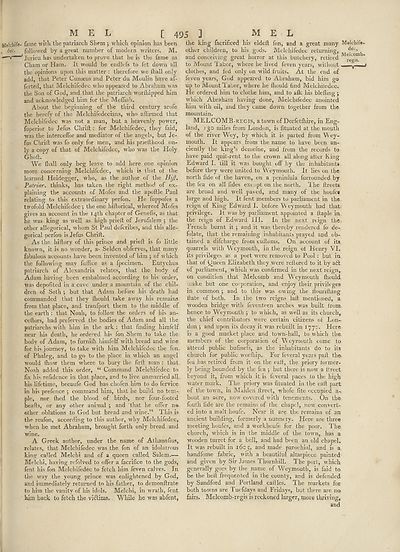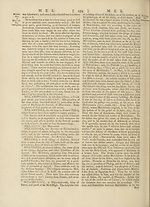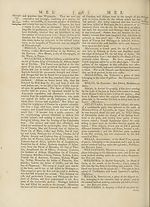Encyclopaedia Britannica, or, a Dictionary of arts, sciences, and miscellaneous literature : enlarged and improved. Illustrated with nearly six hundred engravings > Volume 13, MAT-MIC
(537) Page 495
Download files
Complete book:
Individual page:
Thumbnail gallery: Grid view | List view

MEL [ 495 ] MEL
Melchife- fame with the patriarch Shem j which opinion has been
dec. followed by a great number of modern writers. M.
' Jurieu has undertaken to |)rove that he is the fame as
Cham or Ham. It would be endlefg to let down all
the opinions upon this matter : therefore wxe 11 rail only
add, that Peter Cunseus and Peter du Moulin have af-
ferted, that Melchifedec who appeared to Abraham was
the Son of God, and that the patriarch worlhipped him
and acknowledged him for the Mefliah.
About the beginning of the third century arofe
the herefy of the Melchifedecians, who affirmed that
Melchifedec was not a man, but a heavenly power,
fuperior to Jefus Chrift : for Melchifcdec, they faid,
was the interceffor and mediator of the angels, but Je¬
fus Chrift was fo only for men, and his pnefthood on¬
ly a copy of that of Melchifedec, who was the Holy
Ghoft.
We (hall only beg leave to add here one opinion
more concerning Melchifedec, which is that ot the
learned Heidegger, who, as the author of the Hijl.
Patriar. thinks, has taken the right method of ex¬
plaining the accounts of Mofes and the apoftle Paul
relating to this extraordinary perfon. He fuppofes a
twofold Melchifedec ■, the one hiftorieal, whereof Mofes
gives an account in the 14th chapter of Genefis, as that
he was king as wrell as high prieft of Jerufalem ; the
other allegorical, whom St Paul defcribes, and this alle¬
gorical perfon is Jefus Chrift.
As the hiftory of this prince and prieft is fo little
known, it is no wonder, a^ Selden obferves, that many
fabulous accounts have been invented of him ; of which
the following may fuffice as a fpecimen. Eutychus
patriarch of Alexandria relates, that the body of
Adam having been embalmed according to his order,
was depoftted in a cave under a mountain of the chil¬
dren of Seth ; but that Adam before his death had
commanded that they fliould take away his remains
from that place, and tranfport them to the middle of
the earth : that Noah, to follow the orders of his an-
ceftors, had preferved the bodies of Adam and all the
patriarchs with him in the ark : that finding himfelf
near his death, he ordered his fon Shem to take the
body of Adam, to furniftr himfelf with bread and vfinc
for his journey, to take with him Melchifedec the fon
of Phaleg, and to go to the place in which an angel
would (how them where to bury the firft man : that
Noah added this order, “ Command Melchifedec to
fix his refidence in that place, and to live unmarried all,
his lifetime, becaufe God has chofen him to do fervice
in his prefence •, command him, that he build no tem¬
ple, nor fhed the blood of birds, nor four-footed
beafts, or any other animal ; and that he offer no
other oblations to God but bread and wine.” This is
the reafon, according to this author, why Melchifedec,
when he met Abraham, brought forth only bread and
wine.
A Greek author, under the name of Athanafius,
relates, that Melchifedec was the fon of an idolatrous
king called Melchi and of a queen called Salem.—
Melchi, having refolved to offer a facrifice to the gods,
fent his fon Melchifedec to fetch him feven calves. In
the w'ay the young prince w’as enlightened by God,
and immediately returned to his father, to demonftrate
to him the vanity of his idols. Melchi, in tvrath, fent
him back to fetch the victims. While he was abfent,
the king facrificed his eldeft fon, and a great many Melchifs-
other children, to his gods. Melchifedec returning,
and conceiving great horror at this butchery, retired A
to Mount 'labor, where he lived feven years, without - '
clothes, and fed only on wild fruits.. At the end of
feven years, God appeared to Abraham, bid him go
up to Mount Tabor, where he fliould find Melchiiedec.
He ordered him to clothe him, and to aik his blefling j
which Abraham having done, Melchifedec anointed
him with oil, and they came down together from the
mountain.
MELCOMB-regis, a town of Dorfetfhire, in Eng¬
land, 130 miles from London, is fituated at the mouth
ot the river Wey, by which it is parted from W ey¬
mouth. It appears from the name to have been an¬
ciently the king’s demefne, and from the records to
have paid quit-rent to the crown all along after King
Edward I. till it was bought off by the inhabitants
before they were united to Weymouth. It lies on the
north fide of the haven, on a peninfula lurrounded by
the fea on all fides exc pt on the north. 'Ihe ftreets
are broad and well paved, and many of the houfei
large and high. It fent members to parliament in the
reign of King Edward I. before Weymouth had that,
privilege. It was by parliament appointed a ftaple in.
the reign of Edward III. In the next reign the
French burnt it ; and it was thereby rendered fo de¬
folate, that the remaining inhabitants prayed and ob¬
tained a difeharge from cuftoms. On account of its
quarrels with Weymouth, in the reign ot Henry VI.
its privileges as a port Avere removed to Pool : but in
that of C^ueen Elizabeth they were reftored to it by adt
of parliament, which was confirmed in the next reign,
on condition that Melcomb and Weymouth fhould
make but one corporation, and enjoy their privileges
in common ; and to this was owing the ftourilhing
ftate of both. In the two reigns laft mentioned, a
Avooden bridge Avith feventeen arches was built from
hence to Weymouth } to which, as well as its church,
the chief contributors Avere certain citizens oi Lon¬
don *, and upon its decay it Avas rebuilt in 177". Here
is a good market place and town-hall, to which the
members of the corporation of Weymouth come to
attend public bufinefs, as the inhabitants do to its
church for public Avorfliip. For feveral years paft the
fea has retired from it on the eatt, the priory former¬
ly being bounded by the fca j but there is notv a ttreet
beyond it, from Avhich it is feveral paces to the high
Avater mark. The priory Avas fituated in the eaft part
of the toAvn, in Maiden ftreet, whofe fite occupied a-,
bout an acre, now covered with tenements. On the
fouth fide are the remains of the chapel, noAV convert¬
ed into a malt houfe. Near it are the remains of an
ancient building, formerly a nunnery. Here are three
meeting houfes, and a Avorkhoufe for the poor. The
church, Avbich is in the middle of the toAvn, has a
Avooden turret for a bell, and had been an old chapel.
It was rebuilt in 1605, and made parochial, and is a
handfome fabric, Avith a beautiful altarpiece painted
and given by Sir James Thornhill. The port, which
generally goes by the name of Weymouth, is faid to
be the beft frequented in the county, and is defended
by Sandford and Portland callles. The markets for
both towns are Tuefdays and Fridays, but there are no
fairs. Melcomb-regis is reckoned larger, more thriving,
and
Melchife- fame with the patriarch Shem j which opinion has been
dec. followed by a great number of modern writers. M.
' Jurieu has undertaken to |)rove that he is the fame as
Cham or Ham. It would be endlefg to let down all
the opinions upon this matter : therefore wxe 11 rail only
add, that Peter Cunseus and Peter du Moulin have af-
ferted, that Melchifedec who appeared to Abraham was
the Son of God, and that the patriarch worlhipped him
and acknowledged him for the Mefliah.
About the beginning of the third century arofe
the herefy of the Melchifedecians, who affirmed that
Melchifedec was not a man, but a heavenly power,
fuperior to Jefus Chrift : for Melchifcdec, they faid,
was the interceffor and mediator of the angels, but Je¬
fus Chrift was fo only for men, and his pnefthood on¬
ly a copy of that of Melchifedec, who was the Holy
Ghoft.
We (hall only beg leave to add here one opinion
more concerning Melchifedec, which is that ot the
learned Heidegger, who, as the author of the Hijl.
Patriar. thinks, has taken the right method of ex¬
plaining the accounts of Mofes and the apoftle Paul
relating to this extraordinary perfon. He fuppofes a
twofold Melchifedec ■, the one hiftorieal, whereof Mofes
gives an account in the 14th chapter of Genefis, as that
he was king as wrell as high prieft of Jerufalem ; the
other allegorical, whom St Paul defcribes, and this alle¬
gorical perfon is Jefus Chrift.
As the hiftory of this prince and prieft is fo little
known, it is no wonder, a^ Selden obferves, that many
fabulous accounts have been invented of him ; of which
the following may fuffice as a fpecimen. Eutychus
patriarch of Alexandria relates, that the body of
Adam having been embalmed according to his order,
was depoftted in a cave under a mountain of the chil¬
dren of Seth ; but that Adam before his death had
commanded that they fliould take away his remains
from that place, and tranfport them to the middle of
the earth : that Noah, to follow the orders of his an-
ceftors, had preferved the bodies of Adam and all the
patriarchs with him in the ark : that finding himfelf
near his death, he ordered his fon Shem to take the
body of Adam, to furniftr himfelf with bread and vfinc
for his journey, to take with him Melchifedec the fon
of Phaleg, and to go to the place in which an angel
would (how them where to bury the firft man : that
Noah added this order, “ Command Melchifedec to
fix his refidence in that place, and to live unmarried all,
his lifetime, becaufe God has chofen him to do fervice
in his prefence •, command him, that he build no tem¬
ple, nor fhed the blood of birds, nor four-footed
beafts, or any other animal ; and that he offer no
other oblations to God but bread and wine.” This is
the reafon, according to this author, why Melchifedec,
when he met Abraham, brought forth only bread and
wine.
A Greek author, under the name of Athanafius,
relates, that Melchifedec was the fon of an idolatrous
king called Melchi and of a queen called Salem.—
Melchi, having refolved to offer a facrifice to the gods,
fent his fon Melchifedec to fetch him feven calves. In
the w'ay the young prince w’as enlightened by God,
and immediately returned to his father, to demonftrate
to him the vanity of his idols. Melchi, in tvrath, fent
him back to fetch the victims. While he was abfent,
the king facrificed his eldeft fon, and a great many Melchifs-
other children, to his gods. Melchifedec returning,
and conceiving great horror at this butchery, retired A
to Mount 'labor, where he lived feven years, without - '
clothes, and fed only on wild fruits.. At the end of
feven years, God appeared to Abraham, bid him go
up to Mount Tabor, where he fliould find Melchiiedec.
He ordered him to clothe him, and to aik his blefling j
which Abraham having done, Melchifedec anointed
him with oil, and they came down together from the
mountain.
MELCOMB-regis, a town of Dorfetfhire, in Eng¬
land, 130 miles from London, is fituated at the mouth
ot the river Wey, by which it is parted from W ey¬
mouth. It appears from the name to have been an¬
ciently the king’s demefne, and from the records to
have paid quit-rent to the crown all along after King
Edward I. till it was bought off by the inhabitants
before they were united to Weymouth. It lies on the
north fide of the haven, on a peninfula lurrounded by
the fea on all fides exc pt on the north. 'Ihe ftreets
are broad and well paved, and many of the houfei
large and high. It fent members to parliament in the
reign of King Edward I. before Weymouth had that,
privilege. It was by parliament appointed a ftaple in.
the reign of Edward III. In the next reign the
French burnt it ; and it was thereby rendered fo de¬
folate, that the remaining inhabitants prayed and ob¬
tained a difeharge from cuftoms. On account of its
quarrels with Weymouth, in the reign ot Henry VI.
its privileges as a port Avere removed to Pool : but in
that of C^ueen Elizabeth they were reftored to it by adt
of parliament, which was confirmed in the next reign,
on condition that Melcomb and Weymouth fhould
make but one corporation, and enjoy their privileges
in common ; and to this was owing the ftourilhing
ftate of both. In the two reigns laft mentioned, a
Avooden bridge Avith feventeen arches was built from
hence to Weymouth } to which, as well as its church,
the chief contributors Avere certain citizens oi Lon¬
don *, and upon its decay it Avas rebuilt in 177". Here
is a good market place and town-hall, to which the
members of the corporation of Weymouth come to
attend public bufinefs, as the inhabitants do to its
church for public Avorfliip. For feveral years paft the
fea has retired from it on the eatt, the priory former¬
ly being bounded by the fca j but there is notv a ttreet
beyond it, from Avhich it is feveral paces to the high
Avater mark. The priory Avas fituated in the eaft part
of the toAvn, in Maiden ftreet, whofe fite occupied a-,
bout an acre, now covered with tenements. On the
fouth fide are the remains of the chapel, noAV convert¬
ed into a malt houfe. Near it are the remains of an
ancient building, formerly a nunnery. Here are three
meeting houfes, and a Avorkhoufe for the poor. The
church, Avbich is in the middle of the toAvn, has a
Avooden turret for a bell, and had been an old chapel.
It was rebuilt in 1605, and made parochial, and is a
handfome fabric, Avith a beautiful altarpiece painted
and given by Sir James Thornhill. The port, which
generally goes by the name of Weymouth, is faid to
be the beft frequented in the county, and is defended
by Sandford and Portland callles. The markets for
both towns are Tuefdays and Fridays, but there are no
fairs. Melcomb-regis is reckoned larger, more thriving,
and
Set display mode to:
![]() Universal Viewer |
Universal Viewer | ![]() Mirador |
Large image | Transcription
Mirador |
Large image | Transcription
Images and transcriptions on this page, including medium image downloads, may be used under the Creative Commons Attribution 4.0 International Licence unless otherwise stated. ![]()
| Permanent URL | https://digital.nls.uk/192668143 |
|---|
| Attribution and copyright: |
|
|---|
| Description | Ten editions of 'Encyclopaedia Britannica', issued from 1768-1903, in 231 volumes. Originally issued in 100 weekly parts (3 volumes) between 1768 and 1771 by publishers: Colin Macfarquhar and Andrew Bell (Edinburgh); editor: William Smellie: engraver: Andrew Bell. Expanded editions in the 19th century featured more volumes and contributions from leading experts in their fields. Managed and published in Edinburgh up to the 9th edition (25 volumes, from 1875-1889); the 10th edition (1902-1903) re-issued the 9th edition, with 11 supplementary volumes. |
|---|---|
| Additional NLS resources: |
|

